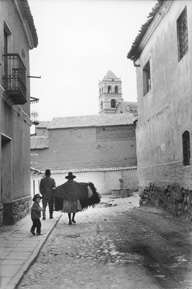Potosi, the Journey
Potosi, le temps du voyage ISRAEL, FRANCE / 2007 / English, Spanish, Hebrew / Color, B&W /
ISRAEL, FRANCE / 2007 / English, Spanish, Hebrew / Color, B&W /
35mm (1:1.66) / 246 min (Film 1: 130 min Film 2: 116 min)
Director, Script, Photography: Ron Havilio
Stills: Ron Havilio, Jacqueline Havilio, Yaël Havilio
Editing: Mela Marquez, Ron Havilio
Sound: Naomi Havilio
Producers: Ron Havilio, Patrick Sobelman
Production Company, Source: EX NIHILO
In 1970, director Ron Havilio and his wife Jacqueline celebrated their wedding in Buenos Aires and then headed for the Andes mountains with backpacks and a still camera. Along the way they came across the Bolivian mining town of Potosi. Twenty-nine years later they revisit Potosi with their three daughters, tying together the present and past. The hushed Andes landscape and uplifting music contrast with the lives people lead in this severe environment. The family proceeds slowly and speaks from the heart.
[Director’s Statement] There is a time in life when we decide to leave the environment we live in and to make a journey. This journey may reveal itself as highly significant to us. We may discover years later that it changed our perception of the world, and the course of our life. It happened to me when I was 20 . . . and again when I was approaching 50.
Potosi was the focus of those two journeys. Though most people outside Bolivia have never heard of that city, I believe it is one of the most powerful places on earth, a city which has played a central role in the history of our civilization.
The 1999 journey, from Buenos Aires to Potosi, lasted less than two months. But I then had to devote seven years of my life to editing the film and completing its production. I had embarked upon a long-term project in a world that seemed to think more and more in the short term.
Potosi, the Journey is a film that goes against current trends. It attempts to work over time in order to capture the simple beauty of daily life. The scenes are filmed as they occur, without staging, and the chronology of the footage has been respected throughout editing. The calm and pervasive rhythm of the film will, I hope, allow the audience to bring in their own experiences, past journeys or desired journeys.
I also hope that this becomes an important film about Bolivia, about a nation that has known great suffering and a country that is experiencing major upheavals at the moment, a country that I love and to which I am able to return a little of what it has given to me.
 Ron Havilio
Ron Havilio
Born in Jerusalem in 1950. As a young boy, he lived in Paris, Istanbul, and Yaounde, Cameroon. He was interested in painting and photography, and studied Art History at the Hebrew University. He then moved to cinema, experimenting with the language of the personal film diary. In 1984, he made a two-hour travel diary, never released. And in 1987 Havilio started working on his monumental Fragments—Jerusalem (1997), a six-hour documentary, personal diary, and family saga interwoven with the history of Jerusalem. The film won the Robert and Frances Flaherty Prize at YIDFF ’97. This film is his first new work in ten years. Havilio has been teaching at the Jerusalem Film School and at the Aikido Institute of Jerusalem. |
